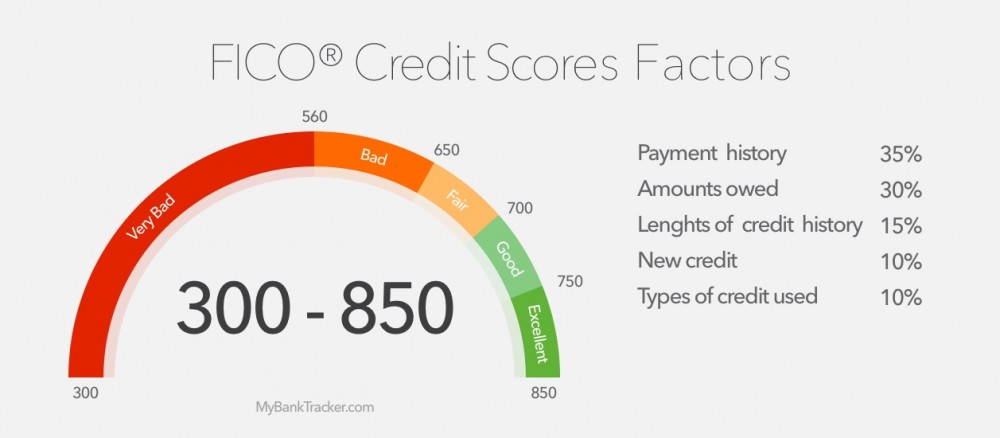In finance, FICO score is a person’s credit score calculated with software from Fair Isaac Corporation (FICO). Improving FICO credit score means improving chances of obtaining a mortgage, but it could improve auto insurance premiums and, possibly, making a person a more attractive employment candidate.
FICO scores range from 300 to 850. Mortgage applicants get the best mortgage rates and terms when their FICO scores are 720 or higher. The FICO credit score takes into account a combination of all of the information found in the credit report. Your FICO score is made up of the following:
- Payment History: 35% of your overall FICO
- Total Amounts Owed: 30%of your overall FICO
- Length of Credit History: 15% of your overall FICO
- New Credit: 10% of your overall FICO
- Type of Credit in Use: 10% of your overall FICO
To find out what is impacting FICO score, reviewing the credit card reports is necessary. A free copy of the credit report can be obtained from each of the three main credit reporting agencies namely, Equifax, TransUnion, and Experian.

http://www.keyword-suggestions.com
For borrowers of all FICO scores, the best way to improve your credit rating is to understand the factors that make up your FICO score and to take specific actions that can make a positive impact on your score. Herewith ways to improve the FICO score based on its categories.
- Payment History Tips
It contributes 35% to a FICO score calculation, thus this category has the greatest effect on improving scores, but past problems like missed or late payments are not easily fixed.
To improve it, paying the bill on time is required. Delinquent payments, even if only a few days late, and collections can have a major negative impact on FICO Scores. However, if you have missed payments, get current and stay current. The longer holding payment to the bills on time after being late, the more FICO Scores increase. Older credit problems count for less, so poor credit performance will not be a huge problem permanently. The impact of past credit problems on FICO Scores fades as time passes and as recent good payment patterns show up on the credit report. And good FICO Scores weigh any credit problems against the positive information that says mentioned on managing credit well.
Be aware that paying off a collection account will not remove it from your credit report. The reason is it will stay on your report for seven years. In it is advisable, if having trouble making ends meet, contact the creditors or see a legitimate credit counsellor. This will not rebuild the credit score immediately, but this is a start to manage credit and pay on time, and the score should increase over time. And seeking assistance from a credit counselling service will not hurt the FICO Scores.
- Amounts Owed Tips
This category contributes 30% to a FICO Score’s calculation and can be easier to clean up than payment history, but that requires financial discipline. It is important to keep balances low on credit cards and other “revolving credit”. The reason is high outstanding debt can affect a credit score. It is highly recommended to pay off debt rather than moving it around. The most effective way to improve the credit scores in this area is by paying down the revolving (credit cards) debt. In fact, owing the same amount but having fewer open accounts may lower your scores. In relation to the credit cards, do not close unused credit cards as a short-term strategy to raise your scores. In addition to that do not open a number of new credit cards that you do not need, just to increase your available credit. This approach could backfire and actually lower your credit scores.
- Length of Credit History Tips
This category consists of 10% overall FICO score. An advisable step to be follow up in this category is if you have been managing credit for a short time, do not open a lot of new accounts too rapidly. New accounts will lower the average account age, which will have a larger effect on your scores if you do not have a lot of other credit information. Furthermore, rapid account buildup can look risky if you are a new credit user.
- New Credit Tips
This category consists of 10% overall FICO score. What needed to do is do your rate shopping for a given loan within a focused period of time. FICO Scores distinguish between a search for a single loan and a search for many new credit lines, in part by the length of time over which inquiries occur.
Another thing that you can do is re-establish your credit history if you have had problems. Opening new accounts responsibly and paying them off on time will raise your credit score in the long term.
Note that it is OK to request and check your own credit report. This won’t affect a score, as long as you order your credit report directly from the credit reporting agency or through an organization authorized to provide credit reports to consumers.
- Types of Credit Use Tips
This category contributes 10% of FICO score. In this category, it is recommended that to apply for and open new credit accounts only as needed. It is not recommended to open accounts just to have a better credit mix because it probably will not raise the credit score. If the credit card is a must, then have them, but manage responsibly. In general, having credit cards and instalment loans and paying timely payments will rebuild the credit scores. Someone with no credit cards, for instance, tends to be higher risk than someone who has managed credit cards responsibly. In addition to that, put in mind that that closing an account does not make it disappears. A closed account will still show up on credit report and may be considered by a score.
To summarize, “fixing” a credit score is more about fixing errors in the credit history (if they exist) and then following the guidelines above to maintain the consistent good credit history. Raising the scores after a poor mark on the report or building credit for the first time will take patience and discipline.






